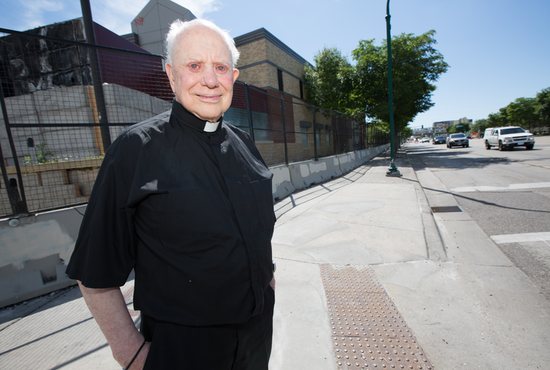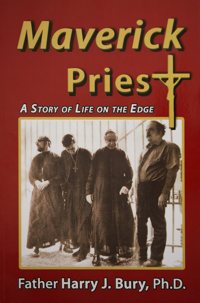
One by one, the experts spoke. They had gathered to address a group of gang members, young African American men united by a Minneapolis nonprofit called Emerge.
First a police officer lectured the young men. Then rehabilitation counselors preached about the horrors of jail.
The last authority on the line-up was wearing a Roman collar. Father Harry Bury had been watching the group closely. He saw their eyes glaze over. He noticed the defensiveness in their crossed arms. So, he prayed to the Holy Spirit for inspiration.
What to say?
“How would you like to go fishing?”
When the gang members got over their surprise, the response was unanimous: yes!
None had ever been fishing before. None, in fact, had ever been in a boat.
Father Bury swiftly arranged for a pontoon ride on Lake Riley in Eden Prairie. Six of the young men showed up, donning life jackets and sharing laughs with the elderly priest as they fished.
Afterwards, one gang member told Father Bury it had been the most fun day of his life.
That approach is quintessential Father Bury, according to Emerge Program Manager Will Wallace — and it’s effective.
“These guys see life differently now,” Wallace said. “One of the young men told me, ‘Watching him take us fishing, I finally feel like I have a chance in the world now.’”
The 90-year-old retired priest from Minneapolis has always shown up in times of need, Wallace said, and he’s never been more needed than now, as the city’s reckoning with racial injustice reaches new fervor.
“Many are called but few are chosen, and I think he’s one of the chosen,” Wallace said. “God put him right there in the mix of everything.”
 Being right there in the mix has taken the longtime peace activist to dangerous places across the globe, which he chronicles in his memoir “Maverick Priest: A Story of Life on the Edge,” which was published in 2018. In 1969, Father Bury was arrested for attempting to celebrate Mass in the Pentagon for the fallen Vietnamese and American soldiers in the continuing war. In 1971, he chained himself to the U.S. Embassy Gate in Saigon at the Vietnamese’s request to protest the raging war. The following year, Father Bury joined other peacemakers to fly to Hanoi and bring back three captured American pilots. And in 2005, he traveled to Gaza to help form a human shield between Israeli settlers and Palestinians. He was abducted and held at gunpoint, but eventually released.
Being right there in the mix has taken the longtime peace activist to dangerous places across the globe, which he chronicles in his memoir “Maverick Priest: A Story of Life on the Edge,” which was published in 2018. In 1969, Father Bury was arrested for attempting to celebrate Mass in the Pentagon for the fallen Vietnamese and American soldiers in the continuing war. In 1971, he chained himself to the U.S. Embassy Gate in Saigon at the Vietnamese’s request to protest the raging war. The following year, Father Bury joined other peacemakers to fly to Hanoi and bring back three captured American pilots. And in 2005, he traveled to Gaza to help form a human shield between Israeli settlers and Palestinians. He was abducted and held at gunpoint, but eventually released.
He did not fear death, Father Bury insists.
“I was worried they’d torture me,” he said. “I’m not very good at handling pain. That was my only worry. But I’m not afraid of dying. Actually, I look forward to dying. There’s a part of me that can’t wait to be with God in eternity. I’m looking forward to that, and I think that’s what gave me courage.”
A commitment to social justice was cultivated early in his life by his parents, who looked out for neighbors and listened to radio programs about the Church’s social teachings. That emphasis was reinforced at St. Bridget’s school and parish on the north side of Minneapolis. And when Father Bury was assigned to serve at the Newman Center at the University of Minnesota in 1965, the students opened his eyes. He began to join them and lead them in anti-war protests.
Over the years, Father Bury’s ministry crisscrossed the globe. He became a distinguished professor and speaker in systems management at Baldwin Wallace University in Ohio, and a lecturer at other universities. He befriended Mother Teresa of Kolkata before she was famous, and a close bond developed. He concelebrated her beatification Mass in Rome.
“Mother Teresa was able to walk a line between being aggressive and getting things done, and being humble and giving all the credit to God,” Father Bury said. “So, I want to be aggressive for good, as Mother Teresa was, but also realize what happens is God, not my doing.”
Ordained in 1955, Father Bury began his ministry at St. Frances Cabrini in Minneapolis, where he served until 1959. Then, he ministered at St. Helena in Minneapolis from 1959 to 1965 before his stint at the Newman Center from 1965 to 1970.
After the Newman Center, he went to graduate school, which led to his peacemaking efforts. Learning how to do research, he was assigned to write a paper and asked the professor if he could research how the Vietnamese people felt about the presence of American soldiers in their country. While visiting Vietnam to conduct some of the research, the Vietnamese priests asked him to return to do a demonstration; his involvement in peacemaking grew from there.
Now retired, he lives in a one-bedroom apartment at the Byrne Residence in St. Paul. His work is far from done. In 2017, he co-founded Twin Cities Non-Violent, an ecumenical group that partners with dozens of other peacemaking organizations, including Emerge. It hosted a summer event in 2018 and again in 2019 calling for 10 days of non-violence. The gang members he met through Emerge organized a block party and grilled hot dogs for their neighbors.
The impact?
“There were no funerals (during the event),” Father Bury said, choking up. “Can you imagine?”
These days he rises around 5:30 a.m. to meditate and do yoga. Much of his power is wielded at the keyboard, emailing people who could collaborate on worthy causes, sharing their phone numbers and areas of expertise.
“When you talk with him one on one, it’s not very easy to say no,” said Dennis Dillon, a member of Twin Cities Non-Violent and of the Basilica of St. Mary in Minneapolis. “He’s dogged but in the most positive way.”
Nancy Nelson, a retired news anchor in Chanhassen, has seen her old friend tear down barriers through the power of his presence. “(Father) Harry walks through the world unequivocally in total love and gentleness,” she said.
That love flows from seeing others as Jesus does, she added. “(Father) Harry is one of the great listeners of the world, and there’s no question that’s one of the reasons he’s so effective, because people feel valued and validated by (Father) Harry.”
As an ardent advocate for racial equality, the nearby death of George Floyd, an African American who died while pleading for breath May 25 under the knee of a white Minneapolis police officer, roused the priest. Two days later he joined Will Wallace in protest, unflinching when the AutoZone on East Street Lake was set on fire.
“It was powerful to have him there,” Wallace said. “And for him to come up by the fire with me — I was stunned.”
Jesus’ teachings in the Gospel are the bedrock of Father Bury’s approach, informing how he responds to violent police officers and to their violent critics. The core of all violence is the tendency to think that punishing people for wrongdoing is the way to prevent wrongdoing, Father Bury often points out. On the contrary, it happens through positive reinforcement, by loving and forgiving criminals.
“One of the biggest challenges for me is to try to understand how people who claim to be Christian can still believe in being violent,” he said. “We have just two commandments: Love God with your whole heart, mind and strength. And love your neighbor as yourself.”
Father Bury lives out the Church’s social teachings in a remarkable way, said Father Erich Rutten, pastor of St. Peter Claver in St. Paul.
“We need peacemakers in all kinds of roles,” Father Rutten said. “We need peacemakers in the day-to-day policymaking of our country. We need policy advocates, that’s the Minnesota Catholic Conference. We need people in the pews who are writing their legislators. That’s all really important. There’s also a role for the idealists. I give Father Harry a lot of credit for taking that idealism and really living it. It’s not just easy words to say. It’s a vision that struggles to be feasible. How do we really get there? Father Harry points the way, and the rest of us are trying to make that real.”



